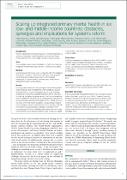| dc.contributor.author | Petersen, Inge | |
| dc.contributor.author | Rensburg, André van | |
| dc.contributor.author | Kigozi, Fred | |
| dc.contributor.author | Semrau, Maya | |
| dc.contributor.author | Hanlon, Charlotte | |
| dc.contributor.author | Abdulmalik, Jibril | |
| dc.contributor.author | Kola, Lola | |
| dc.contributor.author | Fekadu, Abebaw | |
| dc.contributor.author | Gureje, Oye | |
| dc.contributor.author | Gurung, Dristy | |
| dc.contributor.author | Jordans, Mark | |
| dc.contributor.author | Mntambo, Ntokozo | |
| dc.contributor.author | Mugisha, James | |
| dc.contributor.author | Muke, Shital | |
| dc.contributor.author | Petrus, Ruwayda | |
| dc.contributor.author | Shidhaye, Rahul | |
| dc.contributor.author | Ssebunnya, Joshua | |
| dc.contributor.author | Tekola, Bethlehem | |
| dc.contributor.author | Upadhaya, Nawaraj | |
| dc.contributor.author | Patel, Vikram | |
| dc.contributor.author | Lund, Crick | |
| dc.contributor.author | Thornicroft, Graham | |
| dc.date.accessioned | 2022-01-24T08:10:35Z | |
| dc.date.available | 2022-01-24T08:10:35Z | |
| dc.date.issued | 2019-08-06 | |
| dc.identifier.citation | Inge Petersen... et al (2019). Scaling up integrated primary mental health in six low- and middle-income countries: obstacles, synergies and implications for systems reform. BJPsych Open Emerald Series. doi: 10.1192/bjo.2019.7. | en_US |
| dc.identifier.uri | doi: 10.1192/bjo.2019.7 | |
| dc.identifier.uri | https://kyuspace.kyu.ac.ug/xmlui/handle/20.500.12504/280 | |
| dc.description | 8 p. | en_US |
| dc.description.abstract | There is a global drive to improve access to mental healthcare by scaling up integrated mental health into primary healthcare (PHC) systems in low- and middle-income countries (LMICs).
Aims
To investigate systems-level implications of efforts to scale-up integrated mental healthcare into PHC in districts in six LMICs.
Method
Semi-structured interviews were conducted with 121 managers and service providers. Transcribed interviews were analysed using framework analysis guided by the Consolidated Framework for Implementation Research and World Health Organization basic building blocks.
Results
Ensuring that interventions are synergistic with existing health system features and strengthening of the healthcare system building blocks to support integrated chronic care and task-sharing were identified as aiding integration efforts. The latter includes (a) strengthening governance to include technical support for integration efforts as well as multisectoral collaborations; (b) ring-fencing mental health budgets at district level; (c) a critical mass of mental health specialists to support task-sharing; (d) including key mental health indicators in the health information system; (e) psychotropic medication included on free essential drug lists and (f) enabling collaborative and community- oriented PHC-service delivery platforms and continuous quality improvement to aid service delivery challenges in implementation.
Conclusions
Scaling up integrated mental healthcare in PHC in LMICs is more complex than training general healthcare providers. Leveraging existing health system processes that are synergistic with chronic care services and strengthening healthcare system building blocks to provide a more enabling context for integration are important. | en_US |
| dc.language.iso | en | en_US |
| dc.publisher | BJPsych Open Emerald Series. | en_US |
| dc.subject | Mental health services | en_US |
| dc.subject | Integrated care | en_US |
| dc.subject | Primary healthcare | en_US |
| dc.subject | Low -and middle-income countries | en_US |
| dc.subject | Global mental health. | en_US |
| dc.title | Scaling up integrated primary mental health in six low- and middle-income countries: obstacles, synergies and implications for systems reform | en_US |
| dc.type | Article | en_US |

